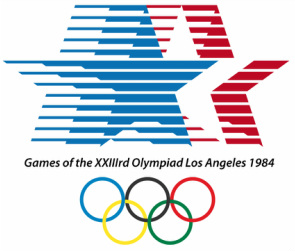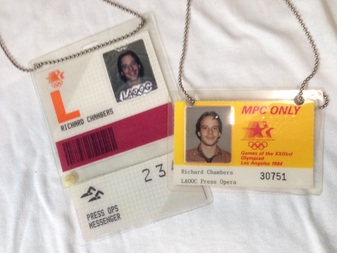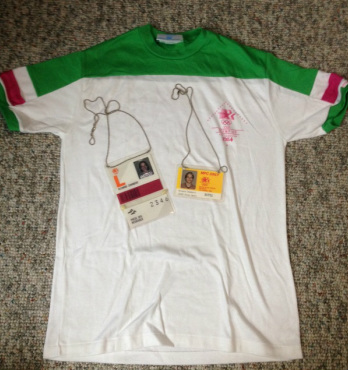Part 1: "Badges? We Don't Need No Stinkin' Badges..."
 "Stars In Motion," the official '84 Games logo
"Stars In Motion," the official '84 Games logo “You mean,” she said, sotto voce, “you guys aren’t athletes?”
I nearly lost my temper. “NO! We’re not athletes! That’s what I’ve been saying!”
The woman glanced around the large bubble building, uncertain about her next move. She settled on stating the obvious.
“You’re not supposed to be in here. You could have been terrorists!”
A security guard appeared. My friend Dick and I were hustled off to a small meeting room and left alone. The door slammed shut; it wasn’t locked, but there was no doubt we were expected to remain.
Dick fretted. “You think we’re in trouble?”
I should have been worried, too. Instead, I was just angry.
This wasn’t how I’d expected the adventure to begin. Fresh out of college, Dick and I had come to Los Angeles as press operations volunteers supporting the 1984 Olympic Games. For three weeks, we would work with staff, competitors and journalists from around the world on one of the greatest Olympics in history.
Thirty years later, I’m reflecting on that experience. There was something special about the 23rd Olympiad, something that, in my view, hasn’t been recaptured in any of the Games since. There was a mix of splendor and simplicity that made it uniquely American—and uniquely in the spirit of the Olympics as first envisioned. Glorious moments from those Games still live in our consciousness, be they jubilant (Mary Lou Retton’s joyful performance in the vault) or tragic (Mary Decker’s tumble off the heel of Zola Budd in the 3,000 meters).
 "Badges? We don't need no stinkin' badges..."
"Badges? We don't need no stinkin' badges..." For most of the past hour, we’d been bounced to and fro within the confines of Los Angeles International Airport. Every few minutes, we were ushered to a new person—one of a cast of colorfully garbed volunteers and security people. I would explain that we were press operations staff trying to get to the Olympic swim venue. And every one of these confused individuals would ask the same question: “Are you athletes?”
“No. Like I said, we’re press operations volunteers. We’re assigned to the swim venue.”
“Oh. Well, where are your security badges?”
Each time, I would swallow my exasperation and explain that we’d just arrived from Michigan, so it wasn’t possible for us to have received security badges yet. In fact, we knew that would be our first task once we reported to the swim venue at USC. But we had to get there first. Our paperwork said to ask any of the people staffing the Olympic information booths at LAX.
That was when our troubles began. The staffers at the booths knew where to direct arriving athletes but were clueless on how to guide the thousands of volunteers streaming into the City of Angels.
By the time we were led onto the tarmac toward the bubble structure quivering in the hot breeze—and surrounded by a phalanx of armed security men—I was sure this wasn’t going to end well. We strolled through a metal detector, endured a thorough sweep by handheld units, and were escorted into the building.
With memories of the massacre at the ’72 Munich Games still fresh, the Los Angeles Olympic Organizing Committee channeled great energy and resources into assuring a secure event. The security force was huge, response plans were exacting, and access to venues and facilities was tightly restricted.
That is, until two guys from Michigan, without any credentials, managed to waltz into the official reception center for international athletes at LAX.
We didn’t wait in the meeting room for long. The door opened, and a professionally dressed woman sailed in. I could see she was at least as angry as I was, but she kept it in check. Instead, she got right to business.
“First, I want to tell you guys that you’re not in trouble. But someone sure as hell is!”
My anger dissipated. Here was someone who had it figured out. Nonetheless, she asked me to repeat our story for the record. I explained how we went to an information booth as our paperwork instructed, how that prompted phone calls and long walks to various LAOOC staffers and volunteers, each of whom heard me explain our mission, and culminating in a security escort to the reception center. I assured her we never presented ourselves as athletes. Indeed, I'd gone to great lengths to insist that we weren't.
Her stare was watchful, measured, and I knew she was evaluating both my story and my credibility. Fortunately, both met muster. She apologized for the confusion and arranged for someone to drive us to the swim venue. She also promised there would be no further security breaches of this sort. I’ve no doubt she kept that vow.
 My uniform shirt from the '84 Olympics.
My uniform shirt from the '84 Olympics. By the time we crashed that night, we’d been awake for more than 24 hours.
The next day, I would don the dubious colors of the ’84 Olympics and begin one of the greatest adventures of my life as a press operations volunteer, watching history unfold at poolside in the swim venue and at other locations across the city.
But first, there was this black widow spider….
Next time: “You! You, I no love!”

 RSS Feed
RSS Feed
